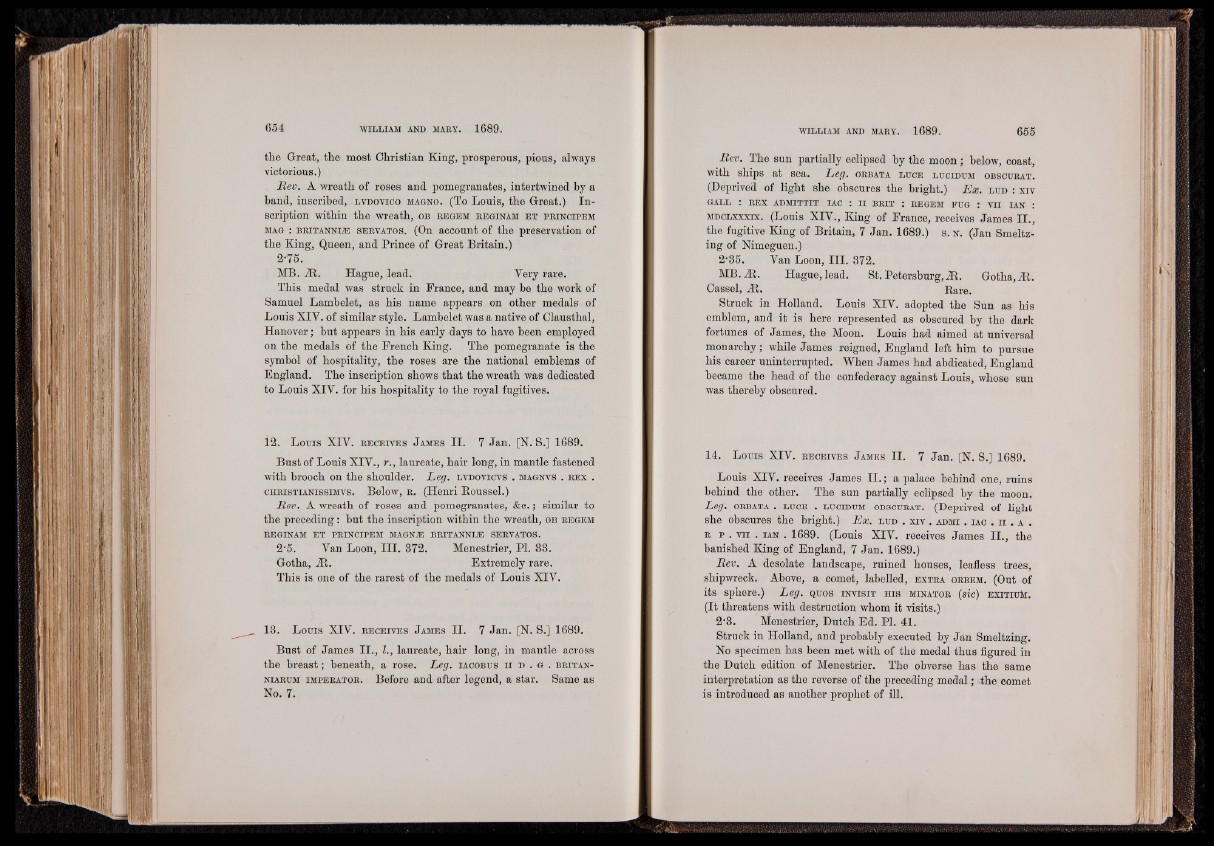
the Great, the most Christian King, prosperous, pious, always
victorious.)
Rev. A wreath of roses and pomegranates, intertwined by a
band, inscribed, l v d o v i c o m a g n o . (To Louis, the Great.) In scription
within the wreath, o b e b g em e e g in am e t p b in c ip em
m a g : b e i t a n n l e s e e y a t o s . (On account of the preservation of
the King, Queen, and Prince of Great Britain.)
2-75.
MB. At. Hague, lead. Very rare.
This medal was struck in France, and may be the work of
Samuel Lambelet, as his name appears on other medals of
Louis XIV. of similar style. Lambelet was a native of Clausthal,
Hanover; but appears in his early days to have been employed
on the medals of the French King. The pomegranate is the
symbol of hospitality, the roses are the national emblems of
England. The inscription shows that the wreath was dedicated
to Louis XIV. for his hospitality to the royal fugitives.
12. Louis XIV. e e c e iv e s J am e s II. 7 Jan. [N. S.] 1689.
Bust of Louis XIV., r., laureate, hair long, in mantle fastened
with brooch on the shoulder. Leg. lvdovicvs . magnvs . e e x .
c h e is t ia n is s im v s . Below, e . (Henri Boussel.)
Rev. A wreath of roses and pomegranates, &c.; similar to
the preceding: but the inscription within the wreath, ob e e g em
e e g in a m e t p e in c ip e m magnae b e it a n n l e s e ev a to s .
2’5. Van Loon, III. 372. Menestrier, PI. 33.
Gotha, At. Extremely rare.
This is one of the rarest of the medals of Louis XIV.
13. Louis XIV. e e c e iv e s J ame s II. 7 Jan. [N. S.] 1689.
Bust of James II., I., laureate, hair long, in mantle across
the breast; beneath, a rose. Leg. ia c o bu s i i d . g . b e it a n -
n ia eum im p e e a t o e . Before and after legend, a star. Same as
No. 7.
Rev. The sun partially eclipsed by the moon ; below, coast,
with ships at sea. Leg. o ebata l u c e lu c id um o b sc u e a t .
(Deprived of light she obscures the bright.) E x . lu d : xrv
GALL : EEX ADMITTIT IAC : II BEIT : EEGEM FUG : VII IAN :
mdclxxxix. (Louis XIV., King of France, receives James II.,
the fugitive King of Britain, 7 Jan. 1689.) s. N. (Jan Smeltz-
ing of Nimeguen.)
2‘35. Van Loon, III. 372.
MB. At. Hague, lead. St. Petersburg, At. Gotha, At.
Cassel, At. Rare.
Struck in Holland. Louis XIV. adopted the Sun as his
emblem, and it is here represented as obscured by the dark
fortunes of James, the Moon. Louis had aimed at universal
monarchy; while James reigned, England left him to pursue
his career uninterrupted. When James had abdicated, England
became the head of the confederacy against Louis, whose sun
was thereby obscured.
14. Louis XIV. e e c e iv e s J am e s II. 7 Jan. [N. S.] 1689.
Louis XIV. receives James II.; a palace behind one, ruins
behind the other. The sun partially eclipsed by the moon.
Leg. oebata . l u c e . lu c id um o b sc u ea t . (Deprived of light
she obscures the bright.) Ex. l u d . xrv . a dm i . iao . i i . a .
e p . v i i . ia n . 1689. (Louis XIV. receives James II., the
banished King of England, 7 Jan. 1689.)
Rev. A desolate landscape, ruined houses, leafless trees,
shipwreck. Above, a comet, labelled, e x t e a o e b em . (Out of
its sphere.) Leg. quos in v is it h is m in a to e (sic) e x it iu M.
(It threatens with destruction whom it visits.)
2-3. Menestrier, Dutch Ed. PI. 41.
Struck in Holland, and probably executed by Jan Smeltzing.
No specimen has been met with of the medal thus figured in
the Dutch edition of Menestrier. The obverse has the same
interpretation as the reverse of the preceding medal; -the comet
is introduced as another prophet of ill.